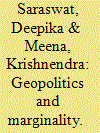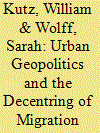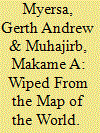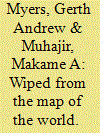| Srl | Item |
| 1 |
ID:
151207


|
|
|
|
|
| Summary/Abstract |
Theorisation in modern geopolitics is replete with instances where certain regions have been accorded a marginal status in various schemes of global political–geographical configurations. Geopolitical ideas propounded by Halford J. Mackinder, Nicholas Spykman and Saul B. Cohen are all evidence of geopolitical visualisation and ordering which advantage certain parts of the world by geo-graphing them as strategically important. This ordering disadvantages certain other areas as less important and, therefore, marginal in the context of international politics. The study here attempts to locate the ascription of marginality in modern geopolitics.
|
|
|
|
|
|
|
|
|
|
|
|
|
|
|
|
| 2 |
ID:
189105


|
|
|
|
|
| Summary/Abstract |
In 2018, the International Organization for Migration stated that ‘migration has nearly become synonymous with urbanization, given the dominance of the city as the destination of most migrants’. The geopolitical dimension of migration governance is especially important in Mediterranean cities where the European Union’s (EU) efforts to push border management onto external actors has occurred alongside the transfer of new powers, competencies, and responsibilities for local authorities. Morocco is one such country where a number of administrative and territorial reforms have sought to transform the territoriality of migration governance, and by extension the structure of Euro-Mediterranean affairs. Our objective is to examine more fully how distinctly local aspects of Moroccan migration diplomacy have been harnessed as a force for geopolitical action today. The approach serves to decentre analysis of EU migration policy by rescaling the focus of migration to the urban peripheries of Europe, and to thereby contest Eurocentric accounts of migration governance in the region. Based on an analysis of Moroccan cities’ involvement in migration governance, including the MC2CM Project – a Mediterranean network of cities supported by EU and international actors – we argue that the rescaling of migration diplomacy aims to ‘change the narrative’ about Morocco’s capacity to manage immigration in light of international condemnation of state violence towards sub-Saharan migrants. In particular, devolution is skilfully used to cast Morocco as an advocate for the empowerment of local authorities managing migration, and migrants themselves as an opportunity for socio-economic development. At the same time, however, we observed that the rescaling of migration governance does not so much change the prevailing autocratic securitization of demographic mobility, but rather restructures its coordination through new governing actors (cities) and management techniques (migration).
|
|
|
|
|
|
|
|
|
|
|
|
|
|
|
|
| 3 |
ID:
123320


|
|
|
|
|
| Publication |
2013.
|
| Summary/Abstract |
This essay uses the case of Zanzibar in its complicated relationship with the United Republic of Tanzania (of which it is a part) as a lens on debates in political geography on empirical and conceptual approaches to critical geopolitics. We test the veracity of a multi-faceted critical geopolitics in the contemporary public contestation of Zanzibar's place in the United Republic from 2008-2012. We analyze Tanzanian media, the speech acts of Tanzanian leaders, and the key events and processes related to what is termed the 'Zanzibar problem' during the selected years, to make two points about a critical geopolitics approach: to strengthen critical geopolitics by broadening the analysis of language to engage political acts and languages beyond the Global North; and taking 'subaltern geopolitics' more seriously via engagement with critical geopolitical voices on discourses, events and processes from the Global South.
|
|
|
|
|
|
|
|
|
|
|
|
|
|
|
|
| 4 |
ID:
123718


|
|
|
|
|
| Publication |
2013.
|
| Summary/Abstract |
This essay uses the case of Zanzibar in its complicated relationship with the United Republic of Tanzania (of which it is a part) as a lens on debates in political geography on empirical and conceptual approaches to critical geopolitics. We test the veracity of a multi-faceted critical geopolitics in the contemporary public contestation of Zanzibar's place in the United Republic from 2008-2012. We analyze Tanzanian media, the speech acts of Tanzanian leaders, and the key events and processes related to what is termed the 'Zanzibar problem' during the selected years, to make two points about a critical geopolitics approach: to strengthen critical geopolitics by broadening the analysis of language to engage political acts and languages beyond the Global North; and taking 'subaltern geopolitics' more seriously via engagement with critical geopolitical voices on discourses, events and processes from the Global South.
|
|
|
|
|
|
|
|
|
|
|
|
|
|
|
|